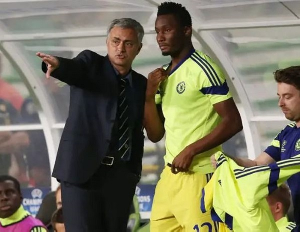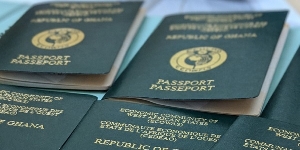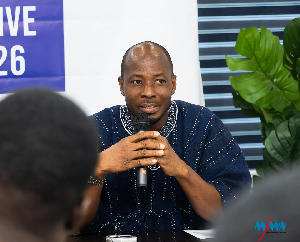Comments On Prez Mills; Akufo Addo, Nana Konadu, JJ and Tsikata
The April, 2010 issue of the Africawatch magazine has 10 pages of an exclusive interview with ex-President John Agyekum Kufuor. We present excerpts from the interview: One year and four months after handing over power, a period during which he had been sorely provoked by innuendoes and comments about his tenure and the state of the economy and nation he left behind, former President John Kufuor is now talking tough.
AFRICAWATCH editor, Steve Mallory had a full session with Ghana's former president. And what an interview it was! Kufuor refused to bite his tongue this time, and whether it was about President Atta Mills, or Jerry John Rawlings, or Nana Konadu Agyeman Rawlings, or Tsatsu Tsikata, or Nana Akufo-Addo, or anybody or anything, Kufuor was prepared to talk about it.
Q: What was the state of the nation when you handed Over power to President Atta Mills? A: I believe the nation was on a very strong base economically, socially and politically. Otherwise, it's just a year ago since I stepped down the same people who complained about an economy that was broke, wouldn't turn round to say the economy was doing well already, they wouldn't have written to the MF when they were seeking credit lines, stating unequivocally that the underpinnings of the economy, the fundamentals, were strong. So it's all politics and propaganda; and given the closeness If the election results, perhaps some people have felt they needed to smear my government in ways that would carry for them some sympathy from the public.
There is no doubt at all that we left a very strong economy and sound political arrangements where he constitution works well. If you travel around the country now and ask who voted for the current government, you won't get many people to admit they voted for them.
Why? Because they have already missed the NPP government. If the NPP government had left a broken system, I am sure the people wouldn't miss us that much. Suppose there were elections today, you will see the results.
Q: Do you like what you are seeing now with regards to the direction President John Atta Mills is taking the country? What is your assessment of the current state of the political and socio-economic situation in the country? A: All I would say is that the economy can do far better than it is doing now, that's all.
Q: During your tenure of office, you stripped your predecessor, Jerry John Rawlings, of some of his protocol privileges? It was not a pretty scene, seeing the former president carry his own luggage through international airports. Why did you do that to him? A: I want to state that I didn't deny him any of his constitutional entitlements.
I appreciate your use of the word protocol. We did that (denied him protocol courtesies) just to try and bring him to order. It is on record that for the first four or five years of our tenure, anytime he was travelling abroad and he alerted us, we availed him all the necessary protocol courtesies. For instance, the missions abroad would accord him courtesies by sending a protocol car; with an officer to attend to his needs. In spite of these protocol courtesies, whenever he had the chance anywhere in the world, he would call a press conference and insult me.
He did it in Nigeria and South Africa, and that was what broke the camel's back. He had gone to the wedding of President Babangida's son in Nigeria. He notified us before he left, so the High Commission there was alerted to accord him the normal courtesies.
After the wedding in Minna, that is Babangida's hometown, Rawlings moved to the national capital, Abuja, and called a press conference at which he described me as incompetent, corrupt, and a disgrace to Ghana.
Naturally, the High Commission reported back to my government about what had gone on. Then Rawlings went to South Africa, and did an interview with the South African Broadcasting Corporation (SABC) which lasted about one hour or more; and there too, he went to town on my government, heaping abuses upon abuses on us. From South Africa too we got the report.
He came back to Ghana, and stayed for a fortnight or a month, and then his secretary wrote to the then foreign minister, Nana Akufo-Addo, informing us that Rawlings intended to travel to Boston in the United States and that he wanted the usual courtesies to be extended to him. The foreign minister brought the letter to me and in the light of what we had experienced during his visits to Nigeria and South Africa, I instructed the foreign minister to write back to him to remind him that the word courtesy implied reciprocity, you respect me, I respect you.
So if he wanted courtesies, then he should also extend courtesies back to us. Not until he showed that, he shouldn't ask us to extend courtesies to him. From then on we stopped advising the missions to roll the red carpet for him, to go and insult us. But his entitlements in terms of what the constitution had provided for him - whether it was about his official residence or remuneration-everything was given to him.
But in terms of asking an ambassador to go to the airport to meet him and those sorts of courtesies, I couldn't do anymore. Because the experience was that, .you extend that respect, this man would abuse it. So that's what happened. Q: Your government spent quite a time prosecuting Rawlings' wife, Nana Konadu Agyeman, for her alleged corrupt involvement in the sale of the Nsawam Cannery to Carridem, a company owned by the 31st December Women's Movement, only for you to stop the trial abruptly just about the time you were leaving office. Why did you do that? And how do you respond to her claims that the trial was politically motivated?
A: The trial wasn't politically motivated. If you look at the transactions that went on, you would see that they were not even completed. The money that should have been paid to the state (by Carridem for the purchase of the Nsawam cannery) was not paid.
It was after I assumed office that obviously they tried to complete the documents which wasn't quite right. When the issue was brought to her notice, she rather took offence and took the initiative of taking the government to court. It was in reaction to her conduct that we decided to straighten matters with her. Our wish was never to bring a person of her stature into disrepute, but obviously they thought they were higher than the law and so she had to be put through due process to let her know that she was as much a citizen as anyone else.
The trial lasted for about five years. If my government was really bent on being vindictive, we could have made a short shrift of it.
We were just hoping that she would be a bit shocked into doing the right things with the necessary decorum. She kept on at every turn, showing utter disrespect and disdain, so we were forced to act. By the time my term ended, I had taken much of her conduct as against me personally, and I advised the attorney general to stop the case. I would leave it to posterity to judge whether the acquisition they tried to make was proper.
I believe her group (the 31st December Movement) tried to acquire some credit line from China and they had expected my government to just endorse it. So when the matter was brought to my attention, I said they should be treated the same way as everybody would be treated.
And I wouldn't sign anything for them outside the normal routine, and that really must have offended them (the Rawlingses) greatly. So that is part of the reason why they hate me.
Q: The enmity between you and President Rawlings has become a source of worry to many people. Some statesmen and church leaders have tried to mediate but to no avail. What do you think it's going to take for the two of you to patch up?
A: God knows I don't hate him. I don't see him as my enemy. But I would admit that, to use the British term, there is no love lost between us. I wouldn't mind talking to him any day, man to man. But I don't know if he will care to look me in the face and talk to me one-on-one, as we should do.
Q: When President Rawlings handed over power to you in January 2001, the relationship between the two of you was not that bad. What really went wrong between you and Rawlings?
A: You should go and ask him. As far as I am concerned, I said it before I assumed power that I would want to respect him the same way I would want to be respected when I was out of power. When I assumed office, the first two months, things seemed to be all right until every now and then he would send an emissary to tell me to meet him at some place. It happened, first, second, and a third time.
The first three I obliged but the fourth time, I sent the person back to tell him I would not meet him anywhere but at the presidency. From then on, he started raining abuses on me and it continued through the eight years that I was in power, going as far as to compare me with Ataa Ayi (one of Ghana's most notorious and dangerous criminals), What is he up to, I can't understand.
Q: During your presidency, you declared "zero-tolerance" for corruption. But, former President Rawlings still insists you and your government were corrupt and lately your own party man, Kwame Pianim, made similar charges against you.
How do you respond? A: Kwame Pianim left my party even before I came to power. Yes Kwame resigned from the NPP. Later on he tried to come back and people perhaps thought he was still one of us.
The truth is that he didn't work in my government. He is a respected person in society and apparently he is also quite close to President Mills. I know him but he wasn't in my team. He didn't work that closely with me. So regarding his pronouncements, you better go and talk to him about them.
As for Rawlings calling anybody corrupt, this man stands on rooftops to talk as if he is a living saint or something. A lot of the time he sounds very hypocritical, and I wouldn't want to react to his pronouncements. I don't think serious people should use him or accept him as a measure of righteousness in our society.
Q: How effective was your zero tolerance for corruption policy? A: When I talked of zero tolerance for corruption, I meant it and that's why we enacted so many laws on it - like the one on procurement where the biggest corruption lies in government. So we said beyond a certain low threshold of procurement, everything must go for open tender, and the procurement authority should be independent.
And that's what is operating now. We improved the conditions of service for the judiciary and empowered them to do their work without fear or favour. We also tried to modernize the court system and so many laws were put in place to curb corruption. That's what I meant by zero tolerance.
Q: Could you comment on the report by the Presidential Commission which probed the activities of Ghana@50 and called for the prosecution of the Secretariat's CEO, Dr. Wereko-Brobby and your former chief of staff, Kwadwo Mpiani, who are also very close to you? A: Well, we shall wait and see what they will be prosecuted for, but I am not convinced that they did anything wrong.
Ghana became the toast of the world because of the efficient manner in which they organised the Ghana@50 celebrations. We all await the prosecutors to tell us what exactly they did wrong. Q: Do you think the NDC government is somewhat trying to use these cases to get at you?
A: They can come for me directly, why should they go around and persecute innocent people just to get at Kufuor? If they think Kufuor stole something or did something against the constitution of Ghana, let them come for Kufuor straightaway and stop persecuting people who only tried to serve their country. Q: When you were about to leave office in January 2009, you took some hard decisions at the eleventh hour. Why did you grant free, absolute and unconditional pardon to Tsatsu Tsikata who had been tried and sentenced to a five-year jail term for "willfully causing financial loss to the state," and his trial went on for about five years ... A: I want the public to know that the court really went through due process and he was found guilty.
At a critical time, some highly-respected individuals, I don't want to mention their names, interceded that the prerogative of pardon should be exercised for him because the point about his guilt had been established with his conviction, he had been in prison for a while, his health was parlous, so I let him go.
When people attain certain levels in society, even a sentence of a day in jail in terms of weight might be the equivalent of some ordinary person being jailed for 10 years. Q: A day before you left office, you also raised public sector workers' salaries - increases of between 16.5 and 34 percent, and which put enormous burden and pressure on the in-coming President Mills. Couldn't you have left that decision for him to make? A: I didn't raise it arbitrarily, we had been working on the single spine salary scheme for years and it was only fair that before I left office I sign it for implementation.
It wasn't an arbitrary thing, everything had been studied in detail into completion and all that was left was for me to let it go ahead. That's what happened. It is not true that we did it to trap the incoming government, no. Q: You have also suggested a review of the appointment of the electoral commissioner? What's the rationale behind this? A: The electoral commissioner, as his office is presently constituted, enjoys the security of tenure like Supreme Court judges, and I don't think the electoral commissioner should so be.
The electoral commissioner's exclusive business is managing elections and we all know how sensitive elections are, so I think that office should not be an indefinite appointment, or in other words, the holder of that office should not be there indefinitely. Look at the current Electoral Commission, the top two people there were appointed far back as 1990 or 1991 and they have been there till now.
A commission that lasts for 25 to 30 years, is that what we want? If we are not careful, we will also put them outside the veil of the constitution that demands accountability from all of us. Why should we put these people over and above the constitution? So I am saying let them be reminded that they should be accountable to the people whose interest they are trying to serve and so let us find the constitutional arrangement by which say, after every election, their mandates would be renewed or revoked based on their performance as impartial referees. Stay tuned!













